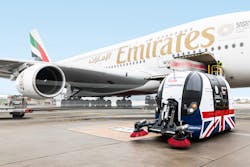The world we live in is evolving fast. The challenges of climate change, growing populations, and rapid technological change are transforming the way we live, and now more than ever, innovation is crucial to designing a brighter future across all industries. Transportation is one of the most essential factors in ensuring global progress, and airports play a pivotal role.
The UK is home to Europe’s largest aviation network, with millions of people passing through our airports every year. Heathrow ranks #7 in the ACI’s top 20 busiest airports with more than 80 million visitors in 2018.
Enterprising British companies are rising to the challenge and opportunity of our new technologically enabled society and helping UK airports effectively balance this capacity. The UK government has put innovation, and the policies it needs to prosper, at the heart of our economy with an industrial strategy that enables research, diverse talent, and commercial development in artificial intelligence, big data, low-carbon technologies, and automation.
As a result, innovation from UK companies is booming. They’ve improved a wide array of processes, from prediction accuracy for heart disease, to neutralization of cyber attacks, to helping passengers and their belongings move through airports more efficiently and safely than ever before.
Just last month, it was announced that ground-breaking new 3D cabin baggage screening equipment would be introduced in all major UK airports by 2022. This is just one example of technology improving the airport experience. Here is a look at what other UK companies are doing:
Managing Crowds & Congestion with CrowdVision
Last October, JFK’s Terminal 4 announced a partnership with UK company CrowdVision. Their passenger measurement and analytics software will be implemented to optimize operations, mitigate congestion, and forecast the deployment of additional staff to improve the experience of the terminal’s more than 21 million annual passengers.
Implementation will focus on three key areas: curbside, to manage arrival congestion; in the departures area, to ensure check-in is properly staffed; and at security checkpoints, to expedite wait times. The availability of this data will give Terminal 4 staff the ability to deploy crowd-easing solutions in real time.
Improving Passenger Experience with Pointr
London-based Pointr’s technology makes it easier for passengers to find their way around the airport by enabling a more reliable ‘blue dot’ on mobile map apps. In 2017, Gatwick Airport installed 2,000 of Pointr’s indoor navigation beacons across two terminals to enable augmented reality wayfinding, a world first for an airport. The AR navigation allows passengers to see directions through their mobile phone camera, making it easier for them to locate check-in areas, departure gates, and baggage belts.
The technology also enables airport operators to send real-time, location-based notifications to make sure passengers arrive at the gate on time or to promote duty-free, premium services or retailers. It also collects anonymous data on crowd density, passenger flow and staff allocation. The technology, which can be implemented in as little as three weeks, is being deployed across US airports in partnership with the US Department of Homeland Security, and Pointr has also recently signed a contract to be in six Thailand airports.
Streamlining Security & Screening
This year the International Telecommunications Union ranked the UK as the country most committed to cyber security. This commitment is reflected in the number of UK companies already tapped to provide airport security solutions through:
- Biometric authentication: iProov’s patented anti-spoofing technology removes the need for in-person identity checks using biometric face authentication to ensure the user on the other end of a transaction is genuinely present. It removes the need for queuing and border guards, allowing passengers to quickly and securely assert their identity by scanning their face and passport on their own device. iProov is already working with the US Department of Homeland Security to create effortless passenger journeys across remote borders, and the technology can easily be leveraged for use in large airports and at busy borders.
- API data: Yoti facilitates seamless travel, provides airlines with accurate API data, and removes the need for passengers to spend time completing web forms when checking in for flights. In addition, it increases cyber security resilience, removing the need for weak username and password authentication methods. Using Yoti, passengers instantly share verified passport information and a biometric with the airline to form a travel token. On arrival at the airport, passengers can use their face to authenticate themselves at check-in, security, lounges and boarding gates without showing a single document. This increases convenience while reducing transaction times and human document-checking errors. The tech has been successfully trialed at Heathrow and will form part of a live system in the near future.
- Open-source intelligence: Osprey Flight Solutions provide data-led risk management support for the aviation industry using a software-based platform that uses open-source intelligence. They have an expanding client base across the aviation sector, ranging from national and low-cost carriers, to cargo, business and general aviation, to government agencies. They provide the highest level of support instantaneously to operators in understanding and mitigating the threats to their crew, passengers and aircraft.
- Blockchain: Zamna has created a blockchain-powered passenger ID verification platform that connects data sets currently siloed between airlines, governments and security agencies, vastly reducing the need to check physical passenger IDs in airports. The platform speeds up check-in while improving the security of passenger information. Independent tests have confirmed it would take between 1-10 million years to break into just one Zamna passenger ID data set.
Any commitment to security needs to be paired with the ethical use of AI and data, and thorough analysis of a new technology’s implications before it’s rolled out to the public. In the UK the Centre for Data Ethics and Innovation assumes this role, connecting policymakers with industry to develop the right governance for data-driven technologies.
Improving Mobility & Logistics with Aurrigo, Westfield and Johnston
A well-managed move to connected, automated and zero-emission mobility has the potential to increase the convenience and affordability of operations management.
Autonomous vehicle specialist Aurrigo announced earlier this year it had developed the world's first autonomous baggage-carrying dolly, which was designed and built in the UK and sent to Heathrow Terminal 5 to take part in trials for British Airways.
The dolly uses LIDAR and GPS technology to create a self-driving, electric vehicle that increases the speed of loading and unloading luggage. The company is also considering how to use similar technology to transport catering airside and people around terminals. The interest they’ve received from across the globe demonstrates the appetite to automate processes so they can be quicker and safer, removing human error and making the most of real-time data to make things move more efficiently.
UK companies Westfield and Johnston collaborated on a similarly innovative approach to road sweeping. Their AutoSweep brings together a Westfield POD and a Johnston Sweeper to make the UK’s first fully autonomous, electric road sweeper.
Road sweeping is a highly mundane, repetitive job that in some situations is safety-critical. The AutoSweep, which will be trialed at airports in London, Birmingham, and Manchester, reduces the harmful environmental impacts of road sweeping and is fully autonomous to reduce risk and improve employee safety. Delivery of these services by a driverless vehicle also produces time and cost savings.
The fact that many autonomous vehicles are low- or zero-emission has the added benefit of reducing their impact on air pollution. According to the EPA, transportation is the largest source of greenhouse gas emissions in the United States, totaling 28.9% of emissions in 2017. The UK has set a mission to be at the forefront of the design and manufacturing of clean vehicles, with all new cars and vans effectively being zero-emission by 2040, so UK companies are ahead of the curve by delivering low-carbon technology on airport campuses.
McLaren and Deloitte Innovate Air Traffic Management
While McLaren is primarily known for Formula 1, last November, the McLaren Deloitte Alliance announced a collaboration agreement with UK air traffic services provider NATS to bring motorsport technology and data science into the aviation industry, transforming how air traffic management decisions are made.
Using simulation and prediction tools similar to the ones McLaren uses to design cars, they have created Airport Operational Performance Predictor (AOPP). AOPP can create hundreds of thousands of scenario simulations every second, providing a single unified view of the day’s operations. This instantaneous access to data enables better real-time decisions, helping to increase on-time performance, enhance decision-making capabilities, and minimize delays and disruptions while encouraging commercial growth and passenger satisfaction.
To meet the pace of our increasingly interconnected world, demand for the brightest and most innovative solutions is accelerating. Aviation will continue to be essential to opening the skies to freer trade and driving change for the better. I’m proud of the central role so many talented UK firms have in aviation hubs across the globe, and when it comes to designing our future, UK innovation and expertise in AI, big data, green technology and automation are leading the way.
Antony Phillipson is the British Consul General in New York and Her Majesty’s Trade Commissioner for North America. As Consul General, Antony leads the Government’s work promoting UK economic, commercial, political and consular interests in New York, Pennsylvania, New Jersey and Fairfield County, Connecticut. As Trade Commissioner, Antony champions British trade as the UK prepares for future trade agreements with countries around the world and leads the UK’s Department for International Trade in North America.
About the Author

